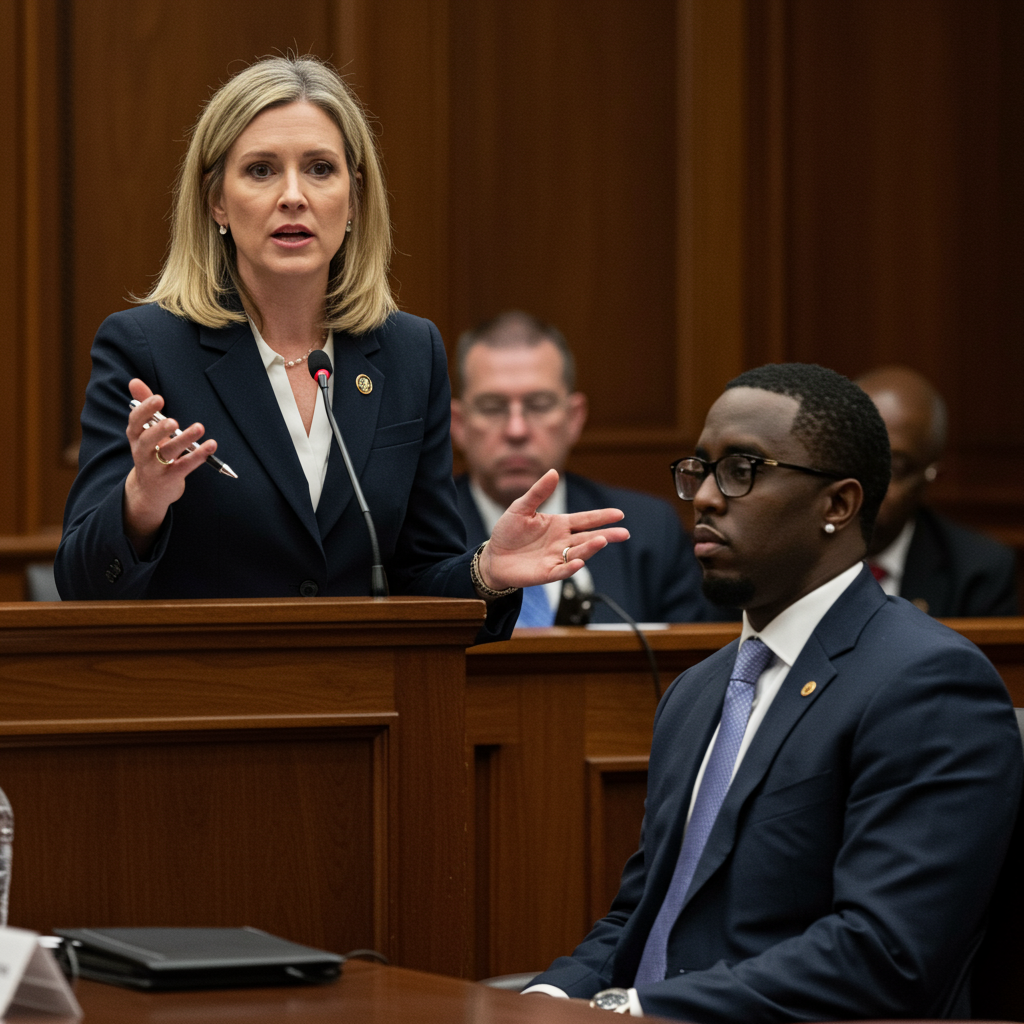After nearly seven weeks of testimony, the federal trial against music mogul Sean “Diddy” Combs reached a critical juncture with the prosecution delivering its lengthy closing argument. For almost five hours, U.S. Attorney Christy Slavik and her team laid out their case, aiming to convince the jury that Combs is guilty of serious federal charges, including sex trafficking and racketeering conspiracy.
The prosecution painted a stark picture, alleging that Combs operated a “criminal enterprise” – akin to a “kingdom” where “everyone was there to serve” him – using his vast power, influence, and business empire as a front. They argued that this enterprise employed a range of illegal activities, including forced labor, kidnapping, bribery, witness tampering, and arson, not merely unconventional personal behavior, to control individuals and silence dissent. Prosecutors suggested key members of Combs’s inner circle, like his chief of staff and head of security, acted as “foot soldiers” facilitating these alleged crimes.
Allegations of Sex Trafficking and Coercion
A core focus of the prosecution’s closing was the claim that Combs coerced women into participating in drug-fueled, multi-day sexual encounters often referred to as “freak-offs” or “hotel nights.” These events, involving male escorts brought in, were presented not as consensual activities, but as “labor and services” forced upon the alleged victims.
Prosecutors detailed specific examples of how Combs allegedly used illegal means – force, threats of force, fraud, and coercion – to compel participation, particularly involving former girlfriend Casandra Ventura (Cassie) and a woman identified as “Jane.”
They argued Combs leveraged financial control, such as paying Jane’s $10,000 monthly rent, explicitly stating he used this to turn a “no into a yes,” demonstrating coercion. An audio message from Combs suggesting a “rude awakening” if she refused a “hotel night” was presented as evidence of veiled threats.
The prosecution also alleged Combs trafficked Jane through fraud, claiming he tricked her into a New York trip under false pretenses while secretly arranging for a male escort from “Cowboys 4 Angels.”
Furthermore, they highlighted the supply of drugs like Ecstasy and MDMA as “essential” to the “freak-offs,” arguing these were used to ensure victims’ participation and compliance, often leading to severe physical ailments like UTIs and inability to sleep for days.
Crucially, the prosecution asserted that they did not need to prove all such encounters were coerced. They argued that if jurors found that just one single “freak-off” was the product of force, threats, fraud, or coercion, that would be sufficient to support a sex trafficking conviction against Mr. Combs.
Evidence Beyond Sexual Allegations
Beyond the sex trafficking charges, the prosecution connected several other alleged crimes to the broader racketeering conspiracy:
Bribery: They cited testimony alleging Combs attempted to bribe hotel security staff after the 2016 incident where he was captured on surveillance video assaulting Cassie Ventura. One guard testified Combs offered a “fistful of cash,” while another claimed Combs promised to “take care” of him and that $100,000 was paid for the video footage to cover up the incident.
Kidnapping: Prosecutors revisited testimony from Cassie Ventura, who claimed Combs forced her to remain at a hotel for a week after brutally assaulting her, and from former assistant Capricorn Clark, who alleged Combs’s bodyguard held her for five days for lie detector tests regarding missing jewelry, implying she had no choice but to comply under threat.
Arson: The prosecution linked Combs to the 2012 setting fire to rapper Kid Cudi’s car, arguing Combs had the motive (jealousy over Cudi dating Ventura) and had previously threatened similar actions. They suggested Combs’s later apology to Kid Cudi was circumstantial evidence of his involvement.
- Witness Tampering: Allegations included efforts to neutralize “Jane” and “Mia” (another former assistant who testified to abuse), referencing a contrived call between Combs and Jane intended to “fabricate evidence.”
- <a href="https://abcnews.go.com/US/live-updates/sean-diddy-combs-trial-updates-prosecution-expects-rest?id=123039309&entryId=123237984&cid=socialtwitterabcn”>abcnews.go.com
- www.yahoo.com
- news.sky.com
- www.straitstimes.com
Digital Footprint and the Defense Counter
The prosecution heavily relied on an extensive digital footprint, presenting thousands of pages of text messages, audio recordings (including from a Notes app), financial records like CashApp payments and travel details (flights, hotel stays across multiple states and countries), and even video evidence. They argued this evidence presented a “clear picture” of Combs committing “crime after crime.”
They also addressed potential defense arguments that the relationships were consensual, noting that appearing compliant in videos or sending affectionate messages could be a result of a “trauma bond” and a “climate of fear” created by Combs, rather than genuine enjoyment. A forensic psychologist previously testified to explain such dynamics.
In their closing, the prosecution urged the jury to find Sean Combs guilty, stating he “knew exactly what he was doing” and that his money, power, and influence had previously allowed him to evade justice, concluding, “that stops now.”
The defense is expected to present their closing argument next, maintaining that Combs engaged in a consensual, unconventional lifestyle and that while domestic issues may have existed, they do not constitute the federal crimes charged.


